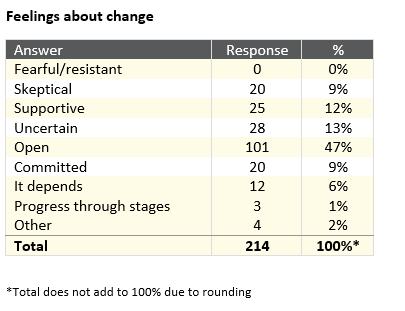Authored by:
Zoya Davis-Hamilton
Associate Vice Provost for Research Administration and Development
Tufts University
Sarah Marina
Assistant Director for Research Administration and Development
Tufts University


In this issue of the Catalyst, we revisit valuable issues.
Republished from Pulse, August 2015.
Change is a constant in our personal lives and work careers, and is something that can be difficult to face. Given the constantly changing regulatory landscape, change is something most research administrators face frequently. In our survey this month, we wanted to learn more about attitudes of research administrators towards change in general and toward changes in rules and regulations that govern sponsored research in particular. We also wanted to learn about the kinds of changes research administrators are experiencing at their institutions. To this effect we invited the subscribers to RESADM-L listserv and those of the weekly email briefs of the Report on Research Compliance to answer a three-question survey. The survey was open between July 15th and July 29th, 2015 and collected 214 responses. Below we share what we have learned from our colleagues.
General feelings about change
Nearly half (101 survey participants or 47%) of those who responded to the survey report that they are open to change/new ways, with additional 12% stating that they are immediately supportive of the change efforts, and another 9% committed to making the change happen. By contrast, sizeable numbers of the survey participants also shared the feelings of uncertainty for the need for change or it’s result (13%) and skepticism of the benefits of change or its success (9%), although no one categorized their feelings as fearful or resistant.
In the true spirit of research administration, those who chose to describe their attitudes as “other” pointed out that the answer is it depends (6%) on both what the change is and its impact. These respondents shared that they need to know why the change is implemented and whether it “makes sense” to become fully supportive of the change efforts. Additionally, we learned that for some the attitude towards change is not a set positive or negative but instead “a ladder that you climb” where “you may begin skeptical but … become more open and/or supportive of the change” when you are sure that it will be a positive change. Other participants told us that “when changes are mandated by federal regulations, there is no option but to support compliance changes,” and that there is more openness to internally identified and developed changes then to those that are “proposed by outside consultants.”

Change experience
We asked survey participants to select multiple answers to describe their experience with change in the workplace. Among those that responded to our survey there were no individuals who have not experienced change in their organization, with most (79%) having experienced changes caused by internal institutional decisions, such as improvement initiatives, reorganization, etc. Additionally, 71% experienced change caused by exterior events such as new regulations, agency audit findings, loss of sponsored funding, etc. Further, 50% of respondents faced changes related to introduction of new technology such as new systems or automated processes. The response “other” highlighted that changes research administrators encounter at their organizations take many different forms and not all of them positive. Respondents reported that change at their organizations were “random”, “inevitable”, “reactive and inefficient rather than proactive and efficient,” and pertaining to “new people.”

Views on changes in rules and regulations
Finally, we asked survey participants what they think about constant changes in rules and regulations that govern sponsored research. It appears that research administrators largely view these changes as a mixed bag, with some being helpful, and others being roadblocks. A large majority (82% of respondents) selected this answer, with additional comments reflecting that their response depends on the specific change in question. A sizeable number of our colleagues (13% of survey participants) believe that changes in rules and regulations are mostly positive as they strengthen accountability for research. In contrast, 5% consider these changes unnecessary because they are detrimental to the conduct of research.

Conclusion
As with many things in life, research administrators’ response to change depends on the circumstances surrounding it. Overall, respondents were open to the idea of change, with the most positive response to changes that are internally proposed and strengthen research administration efforts.
If you have any topics or questions that you want to see addressed in Pulse in the future, please let us know. Send feedback, ideas, questions and inquiries to Zoya Davis-Hamilton at zoya.hamilton@tufts.edu .
We thank Theresa Defino, Editor, Report on Research Compliance for help with survey distribution.
#insights#ResearchAdministration#ThePulse